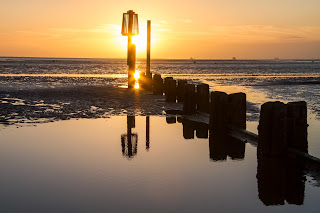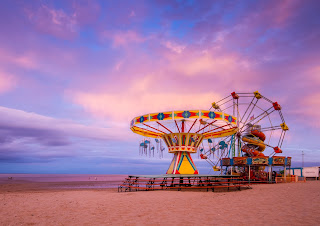I live in a small suburb
of Grimsby/Cleethorpes which sits on the Humber Estuary. As I spend a lot
of my time at Cleethorpes and on the beaches and salt marshes that border the
resort with both my landscape and wildlife photography I have decided to base
this assignment on this location as it is my 'local patch'. I also used
Cleethorpes as a subject for the very similar assignment in Photography 1:
People and Place. Having decided to use the Cleethorpes area again, I
began by looking through my work for P&P and was rather pleased to feel
that my work has definitely improved. I then put those images to one side
and went out to take some fresh ones especially for this assignment. As
well as conveying a strong sense of place, I also wanted to display a range of
styles of photography.
Cleethorpes is small seaside resort adjoining the port of Grimsby. I wanted to show some evidence of its use as a resort, but to me Cleethorpes and its environs mean wide and expansive beaches, salt marshes and huge skies. The estuary is of international importance for wildlife, and hundreds of thousands of waders, geese and waterfowl migrate to spend the winter here. I feel that it is important that my photographs also illustrate this aspect of the area. The beach at the southern end of the resort is a well known and popular location for kite surfing and I wanted to make it the subject of some of my photographs. It would also give me the opportunity to include some action shots. The kite surfing takes place within sight of the Bull and Haille sand forts, part of the first world war coastal defences. Another aspect of Cleethorpes that I wanted to photograph was the town at night looking from the beach towards the prom. The aim of shooting from this location was to capture a reflection of the lights in either the water or wet sand. One small claim to fame for Cleethorpes is that it is on the Greenwich Meridian and the town makes quite a feature of this, one example being the meridian itself as a strip of metal with a notice board and signpost indicating both the north and south poles and their distances as well as such destinations as London, New York and Tokyo. Although a flat estuarine part of the coast, the area does have its wrecks which are revealed at the lowest tides and I wanted to include these.
Cleethorpes is small seaside resort adjoining the port of Grimsby. I wanted to show some evidence of its use as a resort, but to me Cleethorpes and its environs mean wide and expansive beaches, salt marshes and huge skies. The estuary is of international importance for wildlife, and hundreds of thousands of waders, geese and waterfowl migrate to spend the winter here. I feel that it is important that my photographs also illustrate this aspect of the area. The beach at the southern end of the resort is a well known and popular location for kite surfing and I wanted to make it the subject of some of my photographs. It would also give me the opportunity to include some action shots. The kite surfing takes place within sight of the Bull and Haille sand forts, part of the first world war coastal defences. Another aspect of Cleethorpes that I wanted to photograph was the town at night looking from the beach towards the prom. The aim of shooting from this location was to capture a reflection of the lights in either the water or wet sand. One small claim to fame for Cleethorpes is that it is on the Greenwich Meridian and the town makes quite a feature of this, one example being the meridian itself as a strip of metal with a notice board and signpost indicating both the north and south poles and their distances as well as such destinations as London, New York and Tokyo. Although a flat estuarine part of the coast, the area does have its wrecks which are revealed at the lowest tides and I wanted to include these.
I made several photographic
visits to my location during the late summer and autumn in order to cover the
various subjects and optimum times. For
the night shots I needed the lights to be on, which I discovered only happens
at weekends; the tide also needed to be right.
For my wader images I needed high tide to bring the birds within camera
range. I chose a high tide which
coincided with sunrise and used only a medium telephoto as the aim was to include the flock rather than portraits of
individual birds. For my 'tourist'
pictures I opted for a sunny late summer weekend when there would be a good
chance of plenty of visitors being present.
For some of the landscape shots it was necessary to keep an eye on
weather forecasts and visit at sunrise and sunset. Many times the hoped for explosion of colour
at this time of day just didn't happen.
I have chosen to present
the assignment as a set of digital images on a DVD along with my self-appraisal as a word document. In this way it could later be easily
presented for final assessment. All
parts of this assignment are also on my learning blog. I have presented the
images in an order to represent one typical day from sunrise to after dark The
image files are JPEGS at 1284 pixels longest side and 72 dpi to be suitable for
viewing on screen. When I print images I
print straight from Lightroom at 300dpi using the appropriate ICC profile for
the paper I use. I have used Adobe RGB
colour space as there is a wider range in the colour palette at this setting
and therefore more vibrant colours. I
usually also have my camera set to Adobe RGB.
I do the minimum of post
processing and like Ansel, Adams and Edward Weston, I try to' previsualise' an
image and capture that image in camera. My workflow and post processing is
similar for all of my photographs after capture:
·
import into
Lightroom 5;
·
crop if
needed;
·
adjust
exposure/levels;
·
if necessary
adjust the white balance/colour temperature;
·
if necessary
employ the ND grad feature in Lightroom after using the highlight slider;
·
increase
clarity and vibrance slightly and, depending if I have increased the colour
temperature, slightly increase the saturation.
I tend not to use ND grads
in the field as my cokin ones can give a magenta colour cast. I use the ND grad facility in Lightroom 5 as
I know that it is neutral.
I feel that my portfolio
matches my original aims: show a variety of genres and styles and the varied
aspects of the town. However, I feel
that editing down to only 15 images perhaps didn't give enough scope to show
everything I wanted. In retrospect I may
have been better sticking to one genre, in which case I would have opted for
landscape.
Final Set of Images for Submission. To view large, click on a thumbnail)
The order of the images portrays a 'typical' day in Cleethorpes from sunrise through to night time.
Alternative Images that were considered.

































No comments:
Post a Comment